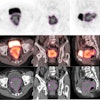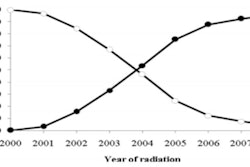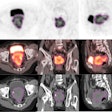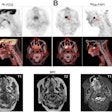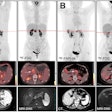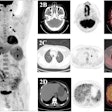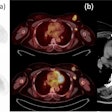Radiation therapy for women with ductal carcinoma in situ (DCIS) can be cut from five to six weeks to as little as three weeks with a modified treatment regimen, according to a report published in the June issue of the International Journal of Radiation Oncology, Biology, Physics.
Conventional treatment for DCIS is breast conservation surgery followed by five to six weeks of adjuvant radiation therapy to the whole breast, an approach that has been the standard of care for at least 15 years. However, radiation oncologists have speculated that a more intense treatment with a shorter duration may be as effective.
Researchers from NYU Langone Medical Center reported five-year outcomes of 145 patients with DCIS who participated in one of two clinical trials following breast conservation surgery. Their outcomes were comparable to patients who received conventional treatment (50 Gy of radiation dose over 25 fractions), according to the study's senior author, radiation oncologist Dr. Silvia Formenti (Int J Radiat Oncol Biol Phys, June 1, 2012, Vol. 83:2, pp. e159-e164).
The researchers examined the effectiveness of two different accelerated approaches in the two clinical trials. Fifty-nine women were enrolled in the first trial; they received a 2.8-Gy radiation dose in 15 fractions administered as 3D conformal radiotherapy over three weeks, for a total dose of 42 Gy. The trial took place between 2002 and 2005.
In the second trial, 2.7 Gy of radiation was given in 15 fractions over a three-week period using intensity-modulated radiation therapy (IMRT), and a 0.5-Gy daily boost was administered to the surgical cavity. The trial included 86 patients and took place between 2005 and 2009.
At the five-year follow-up, among the two groups, six patients (4.1%) developed an ipsilateral breast recurrence. This is within the 5% to 10% recurrence rate demonstrated in randomized clinical trials of DCIS patients receiving the standard five-week course of treatment, leading the researchers to conclude that the accelerated regimens were just as effective.
For three of the six patients, the recurrence occurred at the original site of the DCIS. New contralateral breast cancers occurred in three other cases (two invasive carcinomas and one DCIS).
"The results of our study suggest that DCIS patients can be safely treated with a shorter regimen of radiotherapy," Formenti said in a statement about the study. "This is good news for many breast cancer patients who would prefer to receive their treatments in a shorter period of time, but also want the peace of mind that they are receiving the most effective treatment available."



